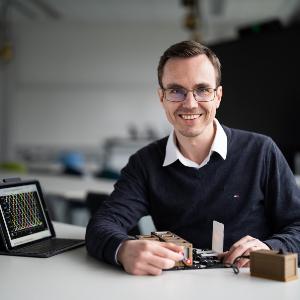Research direction
Investigating the opportunities and challenges of AI in physical education.
Short description
The junior research group AIPE researches and develops learning environments and principles of personalization based on characteristics of learners and process data (eye tracking and EEG). New learning platforms based on classical machine learning methods as well as on large language models are investigated. One focus of the junior research group is the empirical investigation and development of visualizations for concepts of quantum technologies.
Goals/target group
One of the aims of AIPE is to enable and optimize internal differentiation in schools, offering learners a variety of individual support options when learning physics. Such targeted feedback on the learning status and progress of learners cannot usually be provided by teachers on a regular basis due to the time and effort involved. The AIPE junior research group is investigating how AI can effectively support teachers in internal differentiation and thus provide learners with individual learning support.
Another goal of AIPE is the targeted use of AI to reduce the workload of teachers by (partially) taking over various tasks in lesson preparation and follow-up as well as in lesson delivery. These include, for example, (pre-)correcting homework or school assignments, creating tasks and planning and conducting lessons.
Contents
- The influence of personalized cognitive and metacognitive feedback on self-regulated learning processes, concept understanding and critical thinking
- Investigating learners' successful interactions with language models in problem solving
- Gaze behavior in learning and problem solving with multiple representations, especially with convention-based representations such as graphs etc.
- Adaptive provision of learning support based on process data, such as gaze data and EEG
- Learning path analysis and prediction of learning success
- Automated task creation in physics
- Diagnosis and relevance of competences in connection with Large Language Models for learning
- Development of a smartphone game and investigation of the cooperation between humans and AI characters in game-based learning of quantum technologies
- Multiple representations in quantum technologies
- Development of a Europe-wide exchange program in the context of quantum technologies
- Expansion of classic practical experiments with AI-based content
- Critical reasoning and problem solving in online environments
Head

Group Leader AI in Physics Education
